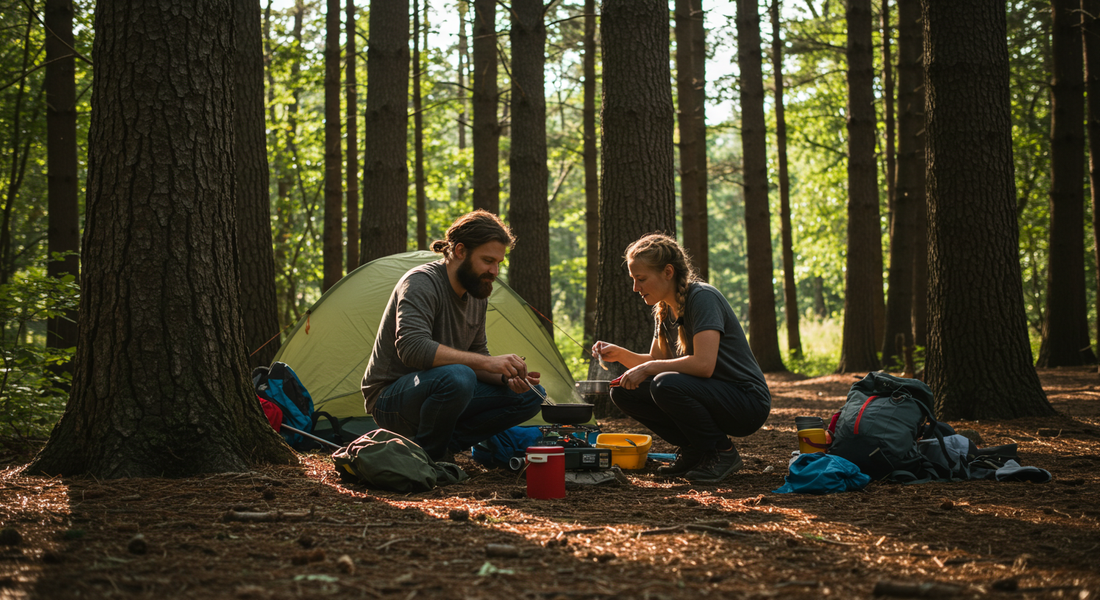
Beginner’s Camping Starter Pack Guide: What You Really Need for Your First Trip
Share
Starting your camping journey can feel overwhelming. With so many gear options, conflicting advice, and the pressure to "do it right," it's easy to overpack or forget something important. But here’s the truth: you don’t need a truckload of gear to enjoy your first night under the stars.
This guide is designed to help beginner campers identify the essentials they need for a successful first trip. Whether you're heading out for a weekend car camping getaway or testing the waters at a nearby campground, we’ll walk you through the must-have items—and what you can skip for now.
Why Keep It Simple?
Too much gear can complicate setup, slow you down, and even take away from the fun. By focusing on the core essentials, you can enjoy the experience without stress. Once you get a feel for your camping style, you can expand your setup over time.
Beginner’s Camping Starter Pack: The Core 10 Essentials
1. Tent (with Rainfly and Footprint)
Start with a basic, weather-resistant 2- or 4-person tent. Make sure it comes with a rainfly (a waterproof cover) and footprint (ground tarp) to protect against moisture.
Tip: Practice setting up the tent at home before your trip.
2. Sleeping Bag
Choose a sleeping bag rated for the season (typically 0–10°C / 30–50°F for spring/fall). Avoid ultra-thin models unless you're camping in summer.
Optional upgrade: Add a sleeping pad or inflatable mattress for comfort.
3. Camp Stove or Portable Burner
Don’t rely solely on a campfire. A compact, gas-powered camp stove lets you boil water, cook simple meals, and make coffee or tea quickly.
Fuel check: Bring the right type of gas canister (usually propane or butane).
4. Cookware and Tableware
Start with a small cook kit that includes:
- 1 pot or pan
- 2 reusable plates/bowls
- 2 utensils (spork or fork & spoon)
- 1 small cutting knife
- Lightweight cups or mugs
Tip: Skip heavy kitchen items. Go with compact and stackable gear.
5. Cooler or Food Storage Bin
For car camping, a hard-sided cooler keeps food and drinks fresh. Bring ice packs or frozen water bottles.
Must-do: Store food securely at night to prevent wildlife encounters.
6. Lighting (Lantern + Headlamp)
You’ll need light after sunset. A battery-powered lantern for the campsite and a headlamp for hands-free tasks are both essential.
Tip: Pack extra batteries or a power bank for rechargeable models.
7. Water and Hygiene Supplies
Bring enough drinking water or a large container if your site has a tap. Don’t forget:
- Toothbrush & toothpaste
- Biodegradable soap
- Quick-dry towel
- Toilet paper or wet wipes
8. Clothing for Changing Conditions
Layered clothing is the key to staying comfortable:
- Base layer: T-shirt and leggings
- Mid layer: Fleece or hoodie
- Outer layer: Waterproof jacket
- Footwear: Hiking shoes or sturdy sneakers + extra socks
Bonus: Always bring a beanie and gloves—even in summer, nights can get cold.
9. Camping Chairs or Mat
A lightweight, foldable camping chair adds comfort during meals or around the fire. A waterproof mat or blanket is a good budget alternative.
10. Basic First Aid Kit
Include:
- Band-aids
- Antiseptic wipes
- Painkillers
- Blister treatment
- Insect bite cream
- Tweezers
Pro Tip: Add any personal medications or allergy supplies.
Optional (But Nice to Have)
- Foldable table
- Hammock
- Portable fan (summer) or hand warmers (fall/winter)
- Trash bags
- Firestarter kit or lighter
You can add these as you grow into camping, but they’re not must-haves for your first trip.
What You Can Skip (for Now)
- Heavy-duty gear meant for extreme conditions
- Expensive ultralight backpacks (unless you're backpacking)
- Overly complex multi-tools
- Large gas grills or full kitchen setups
- Generator or electric appliances
Keep it minimal and functional—you’ll thank yourself later.
Bonus Tips for First-Time Campers
- Arrive early: Give yourself time to set up in daylight.
- Use checklists: Write down what you pack and note what you didn’t use.
- Camp close to home: Pick a drive-in site with restrooms, picnic tables, and water.
- Test your gear: Try your tent, stove, and lights at home or in your backyard.
- Stay flexible: Weather and plans may change. Be ready to adapt.
Conclusion
Your first camping trip doesn’t have to be complicated. With just a few well-chosen items—like a weather-ready tent, a cozy sleeping bag, simple cookware, and reliable lighting—you’re well on your way to creating memorable outdoor experiences.
Start small, stay safe, and give yourself room to learn. The more you camp, the more you’ll know what you love—and what gear truly matters.
